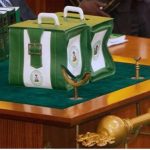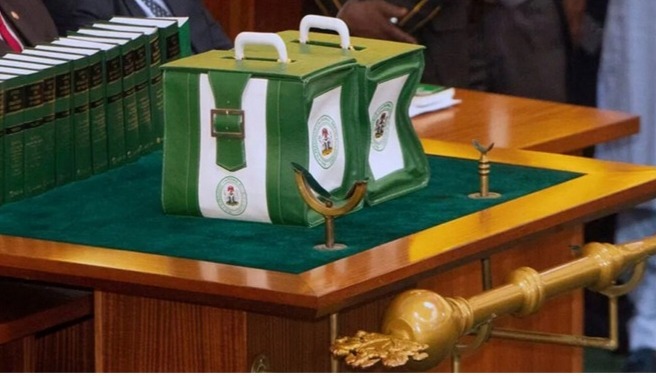N’Assembly condemns poor 2024 budget execution, demands urgent reforms
N’Assembly condemns poor 2024 budget execution, demands urgent reforms
Wants 2025 appropriation to prioritise capital projects
● Adeola, Birchi criticise recurrent expenditure dominance
● Budget Office seeks legislative reforms to cap recurrent spending
The National Assembly has issued a stern warning regarding the poor implementation of the 2024 capital budget, calling for the immediate release of funds to drive economic growth and deliver essential infrastructure projects.
At a joint session involving the Senate and House Appropriations Committees and the Presidential Economic Team, lawmakers decried the lopsided allocation favouring recurrent expenditure, which has achieved 100 per cent performance, while capital projects lag at a mere 25 per cent.
Senator Solomon Adeola and Abubakar Birchi, chairmen of the Senate and House Committees on Appropriations, respectively, expressed frustration over the imbalance, insisting that the 2025 budget must reverse the trend to meet the aspirations of millions of Nigerians.
Adeola emphasised the critical role of capital expenditure in driving economic activities and fulfilling President Bola Tinubu’s Renewed Hope Agenda.
“Capital projects are the backbone of economic growth, yet funds are not being released. We cannot allow MDAs to come for 2025 budget defence with records of non-performance,” he said.
Echoing the Senate’s concerns, Birchi criticised the overreliance on recurrent spending. He argued that less than 10 per cent of Nigerians benefit from this spending, while most are left without basic infrastructure such as schools, hospitals, and roads.
“We must prioritise capital projects over debt repayments and other recurrent expenditures if we want to address the real needs of our people,” Birchi said.
Responding to the lawmakers, Minister of Finance and Coordinating Minister of the Economy, Wale Edun, admitted to delays in capital funding but warned against reckless borrowing to plug gaps.
“We cannot go back to spending money we don’t have. That approach has led to economic crises in other countries. However, we have warrants awaiting payment and are working to resolve funding issues,” Edun explained.
Minister of Budget and Planning, Abubakar Bagudu, attributed the bloated recurrent expenditure to insecurity, unpaid pensions, and other inherited liabilities but assured that efforts are ongoing to balance the budget.
The Director General of the Budget Office, Dr Tanimu Yakubu, called for legislative intervention to cap recurrent expenditure and redirect funds to capital development.
“This administration has settled longstanding obligations, but moving forward, there’s a need for reforms to limit recurrent costs and focus on infrastructure,” Yakubu said.
The meeting, which included the Minister of State for Finance, Dr Doris Uzoka-Anite, and other officials, also examined issues surrounding tax holidays and waivers, which lawmakers say are shrinking government revenues.
With pressure mounting, the National Assembly vowed to closely monitor the 2024 budget’s performance and ensure the 2025 Appropriation Bill prioritises infrastructure, economic growth, and sustainable development.
“The people cannot wait any longer for roads, schools, hospitals, and electricity,” Senator Adeola declared. “We must act now to deliver on the promises of this government.”
Separately, the House of Representatives Public Accounts Committee (PAC) also expressed concern about the poor implementation of the capital component of the 2024 budget.
This came when the Accountant-General of the Federation, Dr Shakirat Madein, appeared before the committee for an interactive session yesterday.
The committee, led by Bamidele Salam, expressed concern when the Accountant-General disclosed that the implementation level of the capital component of the budget was 25 per cent.
It observed that such a low implementation rate was hindering the attainment of the desired economic growth.
The committee urged Madein to submit the Federal Government’s 2022 consolidated financial statement to the Auditor-General of the Federation in compliance with the provisions of the 1999 Constitution.
Salam regretted that, based on recent studies conducted in Kenya, Ghana, and Rwanda, Nigeria still lags in submitting and considering audit reports, mainly due to the failure of the Accountant-General’s office to submit financial statements as required by law.
While reviewing the Accountant-General’s submissions on the low revenue remittances by government-owned enterprises, the PAC chairman emphasised the need for stricter measures to block revenue leakages by automating processes and regular audit exercises.
The committee also directed the Accountant-General, the Ministry of Foreign Affairs, and the Ministry of Interior to resolve all outstanding issues regarding the non-automation of revenue collections from foreign missions to ensure transparency and accountability.
Salam further disclosed that the 2021 Auditor-General’s report, recently submitted to the National Assembly, would receive expedited consideration immediately after the passage of the 2024 Appropriation Bill currently before the House.
Earlier, the Accountant-General of the Federation attributed the delay in submitting the consolidated financial statement to insufficient data on government revenue from the Central Bank of Nigeria (CBN).
She assured the committee that efforts were advanced to obtain the necessary information from the CBN and promised to complete the exercise within two months.
Madein also highlighted several initiatives by her office to strengthen existing regulations and introduce new ones to promote greater accountability in public expenditure management.
She assured the committee that the 2009 Financial Regulations had been reviewed and were awaiting approval from the Federal Executive Council to become operational.
Meanwhile, a security expert, Mr Matthew Ibadin, has commended the Federal Government yesterday for increasing the defence and security budget from N3.89 trillion in 2024 to N4.91 trillion in 2025.
Ibadin, the Chief Executive Officer of Badison Security Ltd, said in an interview with the News Agency of Nigeria (NAN) in Lagos that no amount of money spent on security could be considered excessive.
The expert emphasised that if insecurity persisted in Nigeria, economic activities might not thrive or achieve significant progress.
Ibadin, however, preferred a significant portion of the budget to be specifically allocated towards redefining and enhancing the Nigerian Police Force.
“Defence and security are all-encompassing, but we need to restructure the Nigerian Police because internal security relies on the police. The police are the ones who are supposed to invite the military to come to their aid if need be, but in Nigeria, the military is doing the work of the police. This is the problem we are facing in Nigeria, and the government should be able to revisit that problem,” he said.


